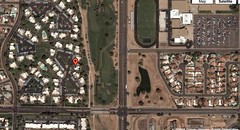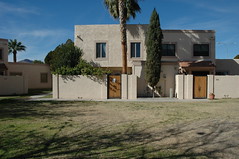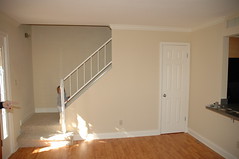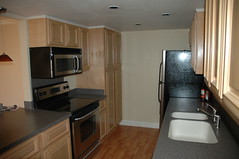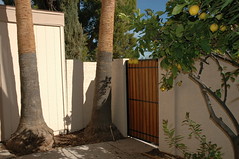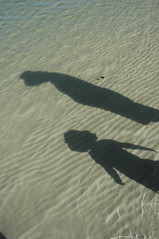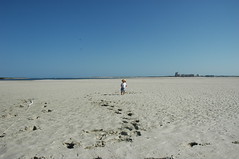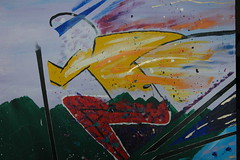We've embarked upon the second most existential quest of our lives. The first,
naming a child, left me humbled and hollow. Taking on the authority to name a person, conferring an identity upon a being felt like the emperor disrobed. What power did I think I possessed to call this person into existence? This, I suspect, is the frightening abyss at the edge of parenthood. It still troubles me on days when Ciela (not a bad name from the existentially fraught hero of our story) looks up at me as if to say, "I cannot possibly be expected to define myself as your daughter for the rest of my existence."
Now, Judy and I have to face the equally fraught aspect of determining the very foundation of our future in Arizona.
We are going to buy real estate.
This monumental decision will ultimately determine our daily lives, our adjacent community, our sense of life, our very being.
I wish I were exaggerating, but the machinery in which we act our lives greatly determines what that life will be.
Winston Churchill said "We shape our buildings; thereafter they shape us," and he's correct. Look at the misery wrought by the modernist hell holes called public housing. Say it loud and say it proud "
Pruitt-Igoe!" They designed warehouses for people, and the dehumanizing architecture did everything to push the inhabitents toward less-than-human.
Our cities are designed for cars, making of us exclusively drivers.
The default housing is the single-family detached home: an isolated factory for producing the american family. The moniker of "domestic engineer" rings true in that each home is manned (personned) by a small staff devoting most of their lives to keeping the house in working order. Housework, yardwork, repair, home projects, the job jar. This is the vocabular of the skewed domestic life, one in which we are laborers instead of humans.
Or consider the soul-killing box I've lived in for the past few months. Our apartment complex is certainly average. Probably better than a lot, but by no means luxurious (at least by western, urban standards). We have three bedrooms, living room, kitchen, small patio and two bathrooms. Spacious for most apartments. Our complex has four pools, one spa, a small fitness center, and nice grounds that are partially lawn and partially desert landscaping. We sit in a somewhat exclusive neighborhood of one of the wealthier cities in the valley.
And for all that, the apartment sucks.
And it sucks for completely avoidable reasons. Yet the design takes into account only the most superficial acknowledgements that people with ideas, desires and spirits will live here.
For starters, why in heaven's name would anyone build a structure on an east-west orientation in the flippin' desert? ALL of our windows face west meaning that June, July, August and September see our apartment morph into a solar oven.
The courtyards are quite nice, and the lucky few who have patios and balconies facing the courtyard are blessed (except for those open to the west, of course). Yet half of the apartments have their outdoor space overlooking parking lots. I can place my nightly bourbon and water on my neighbor's hood ornament. My view is of one palm tree and five Honda's, three Fords, two Saturns, and too many pickups for me to care. Meanwhile, all of the doors to the apartments open into the interior courtyards. Nice except that the doors are completely solid, so when closed, no view of the courtyard exists. Furthermore, putting the doors on the interior means that we are that much further from our cars. I think of this each time I carry groceries into the apartment. Now I'm far from being the type of person that dreams of inviting my car into my home via a heated, tiled garage with cable tv and stereo speakers. But if I'm going to park my car eight feet away from my bedroom window, why in the name of Frank Lloyd Wright can't I just have a door off the parking lot. It's not as if the door to the courtyard is making my life that much richer for the connection to grass and the view of the pool and hedges. I can't even see the fire extinguisher that welcomes people into my apartment.
Of course, all of this is understood by economics. The building plan was not drawn to connect people with their homes or the land on which they sit. If it were, all the apartments would have windows on at least two sides and views of the courtyard. No, the plans were drawn to maximize the number of units and the number of parking spaces within easy access of the major streets that access the community. In fact, the plan was drawn in absolute ignorance of the land, the climate, and the way people interact with these and with the architecture.
The apartment building is a way station. A limbo for people on their way up to better housing, or on their way out. The saddest aspect of this dreary place are those balconies and patios of the long-term residents. Those for whom this is home. Overcrowded with plants, candles, hanging knick-knacks. Packed with too much furniture for guests that never come. They are desparate pictures of failure to find a liveable life in this building.
So I do not overstate the importance of buying a house. The very essence of life is at stake.
